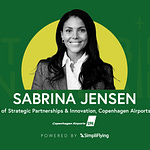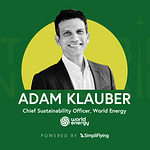Welcome to Season 2 of Sustainability in the Air, the world’s first podcast dedicated to sustainable aviation. Through in-depth conversations with top aviation leaders, we break through the clutter and provide a clear roadmap for a net-zero future.
Airline alliances foster cooperation among airlines and can play a pivotal role in facilitating and spurring the transition towards sustainable aviation. As the largest airline alliance in the world, Star Alliance enables seamless customer experience across its global network, and proclaims sustainability to be at the centre of all their operations. Started in 1997 by five leading airlines, Star Alliance’s membership has steadily grown to include 26 members.
In this episode of our ‘Sustainability in the Air’ podcast, Star Alliance CEO Jeffrey Goh speaks with SimpliFlying CEO, Shashank Nigam and shares how the alliance is supporting airlines in stepping up their sustainability game.
You can listen and subscribe to our podcast on all major podcast platforms or read our deep dive into the episode below.
If you’re rushed for time, you can also directly jump to your topic of interest by referring to these time-stamps:
A Train in the alliance? Deutsche Bahn Partnership (2:00)
Encouraging airlines to be sustainable (10:55)
Sustainability Summit and knowledge sharing (16:30)
Are alliances effective at driving change? (19:30)
Joint procurement of SAF and associated challenges (22:35 & 36:20)
Are airlines playing defence when it comes to sustainability? (26:10)
Sustainability beyond the environmental perspective (31:00)
Jeffrey’s legacy (37:40)
Rapid Fire! (42:45)
Deutsche Bahn Inter-Modal Partnership
Goh has been responsible for digital transformation at Star Alliance and has actively promoted aggressive automation. He has also encouraged knowledge dissemination to the public, with information about flight sustainability initiatives and CO2 reduction methods being disclosed on the alliance website. This, Goh hopes, will amplify Star’s sustainability message and put forth its dedication to the cause.
In August this year, German national railway Deutsche Bahn became the first rail network to join the Star Alliance. This inter-modal partnership, Goh insists, will expand and strengthen the alliance’s global network, and add more choices for customers. Further, with governments, particularly in Europe, proposing bans on short-haul domestic flights, railways are likely to step in to fill the gap.
With the flexibility that the inter-modal partnerships offer, Star is also looking to explore other potential modes of travel (ferries are not out of the question!) and add to them their seamless customer experience. This could mean services like check-in, baggage transfer, access to lounges, loyalty program cooperation would be available across different modes of transportation!
Encouraging Sustainable Behaviour
— Sharing is Caring
Goh recognises that the alliance is not at the forefront of sustainability decisions as they’re not directly in-charge of flying the aircraft. Instead, they support and assist their members through a well-defined framework to undertake necessary sustainability initiatives.
The purposes of this framework are three-fold:
Educating the public: Goh says that there is no dearth of sustainability efforts in the aviation industry. Inadequate public awareness is what paints aviation in an unfavourable light. The alliance reaches out to the public through social media channels to inform and educate them about the initiatives, activities, and projects of member airlines.
Joint procurement: Star Alliance also works with member airlines to support the production and procurement of sustainable aviation fuels (SAF). Given SAF’s low supply, supporting joint sourcing and procurement is a strategic move. The alliance also encourages sourcing of and investment in upcoming innovative technologies. For example, next-generation carbon capture technology to produce liquid fuels.
Knowledge sharing: The alliance serves as a valuable platform where sustainability experts from member airlines can share information, knowledge, and best practices. Members educate each other about their initiatives which may include eliminating plastics, reducing fuel burn or meeting ESG goals.
Star Alliance also hosts an annual Sustainability Summit with airline CEOs and experts for knowledge sharing purposes. In the recent summit, they invited third parties from Airbus as well as reporting agencies. Discussions included driving forward diversity and equality, reducing carbon footprint, making up for the extra cost and premium of procuring SAF and measuring emissions reduction. The Sustainability Committee also gathers each quarter to facilitate discussions among member airlines.
“There’s still so much to learn about sustainability – in terms of what can be done in reducing emissions, for instance. I don’t think we’re there yet. As an industry, we are not there in terms of knowledge. There’s still some way to go on that front.”
Wishing Upon a Star
As an alliance whose members are progressing at different speeds towards their sustainability aspirations, Goh admits that it’s quite challenging to lay down or push any standard practices. He strongly believes that airlines can learn a lot through information sharing, especially since there’s a long path to making aviation a sustainable, net-zero industry.
Goh states that airlines get the short end of the stick when it comes to sustainability and reducing carbon emissions. The aviation industry is an ecosystem of players who must work in tandem to effect any significant change. Goh states that governments and regulatory authorities are sometimes quick to set up targets without figuring out the underlying logistics. For example, they may demand airlines to have 5% SAF blended into the jet fuel by 2030. But if SAF remains in short-supply, a vicious cycle ensues. Thus, aircraft and engine manufacturers, fuel producers and suppliers, and the governments need to collaborate to identify the challenges and the necessary incentives.
Our Take
Moving away from carbon-intensive technologies is one of the primary goals of sustainability. Adoption of low-carbon alternatives in aviation would require changes in the entire ecosystem of the industry. This ecosystem or ‘socio-technical system’ is made up of ‘actors, networks, institutions, artefacts, infrastructure, markets and practices…’ (Geels, 2002). As Goh pointed out, only one part of the ecosystem (or a single actor) cannot drive the system towards its sustainability goals. The adoption of newer technologies requires collective efforts from all actors to outline the challenges and the requisite incentives.
Government support and strong policies have a vital role to play here. In the case of SAF, it is important to incentivise the producers like Neste and Shells, to increase production of SAF. The US government’s SAF Grand Challenge is a positive step towards this. In addition to offering incentives, it is also important to disincentivise existing carbon-laden technologies to ensure that the transformative capacity of newer policies is not diluted.
Airlines progress towards their net-zero aspirations at different speeds. Star Alliance’s efforts to share information and best practices is a great way of supporting everyone, no matter where they are in their sustainability journey. The ultimate goal of sustainability after all, is to move forward such that no one is left behind.
References:
Geels, F.W. (2002) ‘Technological transitions as evolutionary reconfiguration processes: a multi-level perspective and a case-study’, Research policy, 31(8), pp. 1257–1274. doi:10.1016/S0048-7333(02)00062-8.
Our Sustainability in the Air podcast is powered by SimpliFlying which has been helping build trust in travel for over a decade.
This season of the podcast is brought to you by CarbonClick, leaders in managing carbon offsetting programs for top global airlines.













